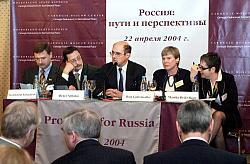 |
|
Mike Solovyanov/ MT
Strobe Talbott,
center, on a panel Thursday with Konstantin Kosachyov, Alexei
Arbatov, Rose Gottemoeller and Martha Brill Olcott.
|
Some 200 thinkers from both sides of the Atlantic gathered in Moscow on
Thursday to discuss the last 10 years of Russia's relationship with democracy,
asking how far Russia has come and how far it has yet to go.
The assessments offered at the conference dedicated to the 10-year anniversary
of the Carnegie Moscow Center were not upbeat. Russia is a democracy on
paper, went the consensus view, but in practice it is an autocracy fully
subordinate to President Vladimir Putin.
Stanford University politics professor Michael McFaul recalled that
one of the center's first round-table discussions after its launch in
1994 by the Carnegie Endowment for International Peace in Washington centered
on the future of Russian liberalism. Despite all the evolution and changes
in Russian politics, "The bad news is, we're back where we started,"
McFaul said. "To me, that's a rather tragic statement."
Grigory Yavlinsky and Sergei
Glazyev, rival economists and politicians who occasionally competed for
the microphone at a morning panel, nonetheless shared contempt for the
way they have been marginalized by Putin's regime. "In politics,
there's no democracy. In the economy, there's no competition. And in the
regime, there is no accountability," Glazyev argued.
Yavlinsky said it was as if Russia was trying to return to the 1930s
under Stalin, "when all decisions are made in one room."
Strobe Talbott, who handled Russian affairs in Bill Clinton's administration,
asked members of the morning panel on democracy how they viewed the balance
of power between Putin and the siloviki in the shadows. "To what
extent is he driving the process and to what extent is he the representative
of more pluralistic forces?" asked Talbott, who is also a member
of Carnegie's board. "Who's in charge here?"
Carnegie analyst Lilia Shevtsova answered that Putin holds complete
power but he has "impotent omnipotence." She described him as
a figure sitting in a bunker, separated from the world and wary of the
people around him, frantically pushing all the control buttons himself.
Glazyev, speaking momentarily in English and looking directly at Talbott,
said, "Putin is in charge."
The speakers debated whether the glass was half empty or half full,
and if so half full of what? One audience member proposed that in fact
the glass itself was broken. So what could have been done differently,
and what were the missed opportunities? Some blamed complacency rooted
in high oil prices. Others pointed to the bad precedent set by President
Boris Yeltsin's arguably artificial re-election victory in 1996. Many
questions were asked, to which there were far fewer answers.
The fate of Russia's democracy was not the only item on the agenda.
Other sessions debated Russia's relationship with Europe, U.S.-Russia
security cooperation and ways to sustain Russia's economic growth.
See also:
the original at
www.themoscowtimes.com
|